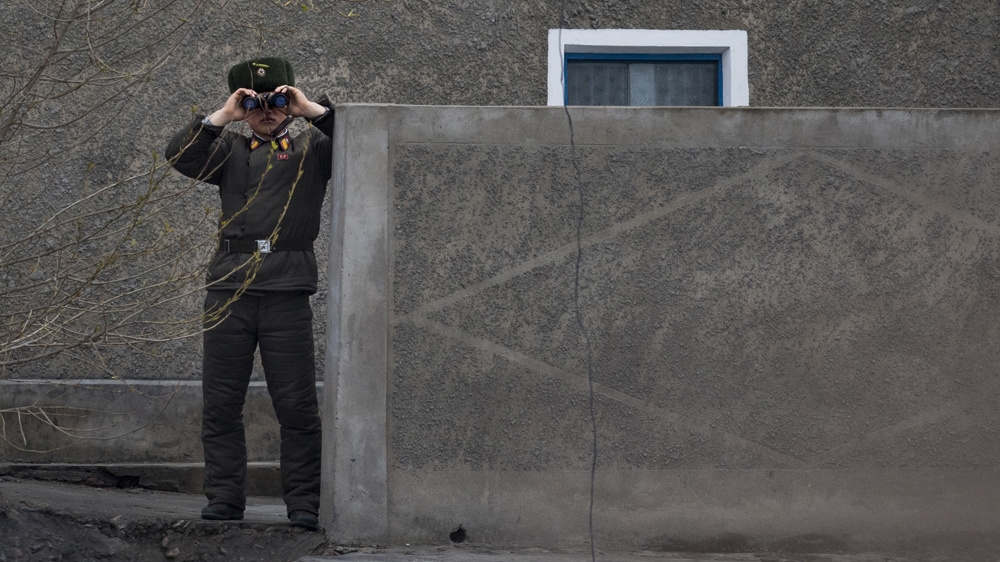Coronavirus in N Korea could be ‘much more lethal’ than in China
Experts say any outbreak in North Korea poses great risks to a population suffering from poor health and malnourishment.
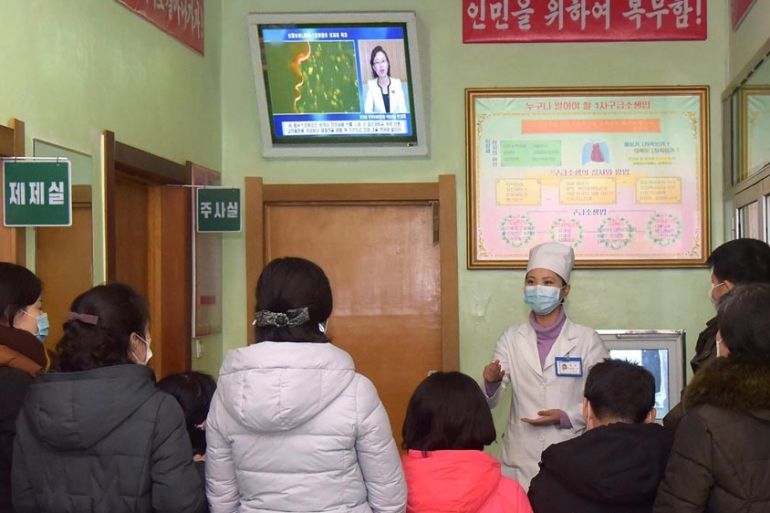
North Korea has not reported a single case of the coronavirus since the outbreak was first detected in neighbouring China in late December, but health experts say infections may be going undetected in the impoverished country – where an outbreak could be “much more lethal”.
The virus, known as COVID-19, has infected 75,000 people and killed more than 2,000 globally. It has spread to two dozen countries, including Pyongyang’s southern neighbour, South Korea, which has reported more than 100 cases.
Keep reading
list of 3 itemsToilet paper, canned food: What explains coronavirus panic buying
Coronavirus: Which countries have confirmed cases?
But the official Rodong Sinmun newspaper, citing the government on Tuesday, insisted there were no confirmed cases so far in the nation of 25 million. The World Health Organization (WHO) backed that statement on the same day, with a senior official telling reporters in Geneva “there are no signals … no indications” of coronavirus in North Korea.
State media, meanwhile, showed images of workers clad in protective suits disinfecting public spaces and undertaking programmes in which health workers educated the public on the dangers of the virus.
And in a bid to limit the spread of the virus, Supreme Leader Kim Jong Un‘s government has effectively halted all flights and trains to China, imposed screening for anyone coming into the capital, and subjected all foreigners, including diplomats and aid workers, to a month-long quarantine – twice the length imposed by many other countries.
North Korea has also closed its 1,500km-long land border with China, a country that accounts for about 90 percent of trade with Pyongyang, and the International Federation of Red Cross has sent 500 volunteers to the border areas to help with screening for infections.
But despite these measures, one South Korean media outlet that covers North Korea says several people who exhibited symptoms similar to the coronavirus infection, known as COVID-19, have died in recent days. Those reports could not be independently confirmed.
One former diplomat who defected to South Korea in 2016 has also questioned the government’s official figures, noting international agencies were unlikely to be able to verify data because of restrictions on their movement.
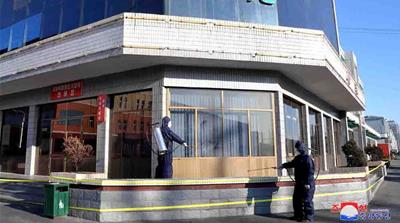
Kim’s government maintains a vice-like grip on people and information in the country.
Meanwhile, more than 200 cases have been reported in the two Chinese provinces bordering North Korea. The relative frequency of Chinese visitors entering through this border, both legally and illegally, and Beijing’s initial slow response to raise the alarm, have compounded fears the virus may have spread to North Korea.
“There is a thriving black market network up on the North Korean/Chinese border,” said Nicholas David Thomas, an associate professor at City University of Hong Kong and a specialist in health security in Asia. “And so all you need is one infected person to be smuggled in or smuggled out … and either state wouldn’t immediately know.”
If the virus did gain a foothold in North Korea, analysts said it could spread swiftly as medical facilities outside of the country’s capital are ill-equipped. Such a development would endanger a population that is already suffering from poor health and malnutrition.
“If (coronavirus) got into North Korea, where there are a lot of other underlying deficiencies and lacking healthcare, the death rate would go up quite a bit,” said Dr John Linton, the director of the International Health Care Center at Yonsei University in South Korea.
“With their general population suffering from malnutrition, it would be much, much worse than China.”
About 11 million citizens – 43 percent of the population – in North Korea are undernourished, and food insecurity is widespread, according to the United Nations. Many in the provinces are also plagued by shortages of clean water.
In 2019, North Korea ranked last out of 195 countries on its ability to rapidly respond to and mitigate the spread of an epidemic, according to the Global Health Security Index published by US-based John Hopkins University, while ranking 193 overall on its health security and capabilities.
|
|
Linton also raised questions over North Korea’s ability to test for the virus, especially in rural areas.
During his own aid work inside North Korea in recent years, Linton said he had visited hospitals where doctors dipped their disposable gloves in betadine to reuse them. At times, medical workers wore “double gloves … trying to cover up the holes,” he said.
They are “lacking basic equipment, basic gowns and gloves” he said, adding he had recently received “indirect” requests for supplies from inside the country: “They want hazmat suits, they want gowns, they want gloves … Those things are always lacking.”
Dr Myung-Ken Lee, the chairman of the Department of Global Health Security at Yonsei University in Seoul and the former director of the United Nations Development Programme (UNDP) in North Korea, echoed that concern.
“In the capital city of Pyongyang, they have a relatively better health system. But other than that, it’s terrible,” he said.
But Dr Edwin Ceniza Salvador, the WHO representative in North Korea, told Al Jazeera that Pyongyang “has the capacity to carry out these tests [for COVID-19] as they have PCR machines”. In a statement, Salvador said the country’s laboratory technicians and experts were trained by WHO in influenza testing in Hong Kong last year.
He added that Pyongyang’s health ministry had screened 141 people who had a fever when they arrived in the country in the past month. All tested negative for the virus. They were among 7,281 travellers who came into the country between December 30 and February 9.
The UN also agency said it was providing protective equipment – including goggles, masks and gowns – for use by North Korean health workers.
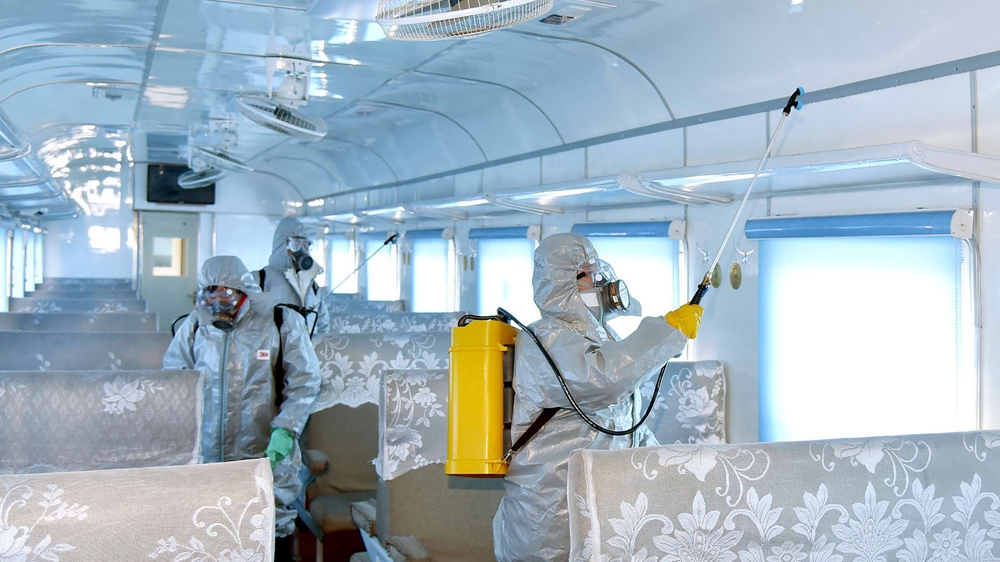
However, Richard Blewitt, the Permanent Observer for International Federation of the Red Cross (IFRC) to the UN, said it was unlikely North Korea had enough supplies to fight an epidemic.
“I’m sure the government had some drugs and masks and things, but there’s an insufficient amount of equipment to deal with any sort of major coronavirus response should that be necessary,” he said. “So we need to mobilise.”
The shortages are, in part, due to UN and US sanctions that have largely crippled North Korea’s economy, a move that pushed it towards a deeper reliance on China. The UN first imposed those sanctions in 2006, shortly after Pyongyang withdrew from the Nuclear Non-Proliferation Treaty and began pursuing nuclear weapons. The United States has also tightened sanctions in recent years.
Most advanced medical technology contains computers, which are sanctioned if they contain beyond a 486 processor – technology that debuted in the late 1980s.
Smaller items containing metal, including scissors, syringes and thermometers are among 19 categories of medical items requiring a sanctions exemption for aid organisations, according to an analysis by South Korea-based NK News.
“The most important thing in a country that has a relatively constrained health system is preparedness,” said Blewitt.
He told Al Jazeera that the organisation was applying for a UN sanctions exemption to deliver testing kits and thermometers, along with protective gear like suits, goggles, and masks, which are not subject to sanctions.
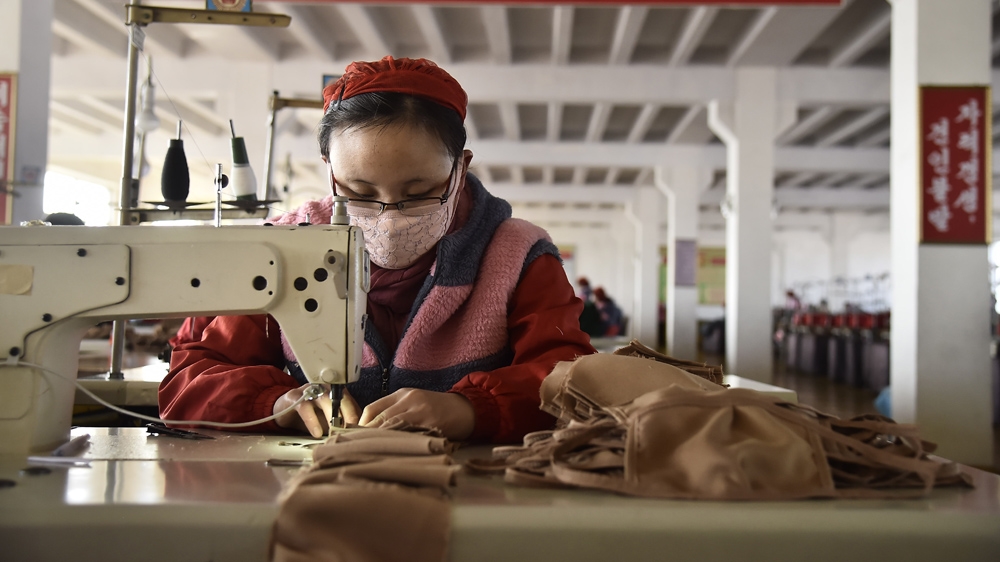
But the drastic measures taken by Pyongyang to prevent the virus from crossing into its borders have also complicated the process for aid organisations on the ground, with foreign personnel unable to leave their homes. It also remains unclear if aid shipments will be allowed, Blewitt said.
Also, as a result of US sanctions, there is no direct banking channel to North Korea, Blewitt said, meaning cash has to be flown in and delivered by hand.
“We are going to be trying to seek some form of exemption, or a process to enable cash to be brought into the country,” he said, adding that the IFRC is running low on funds for transportation and to pay local staff.
“That’s a constraint to coronavirus response scale-up,” he said.
“It’s quite urgent, and I think because of the (30-day) period of quarantine, many organisations need to have the resources on the ground to continue to function.”
